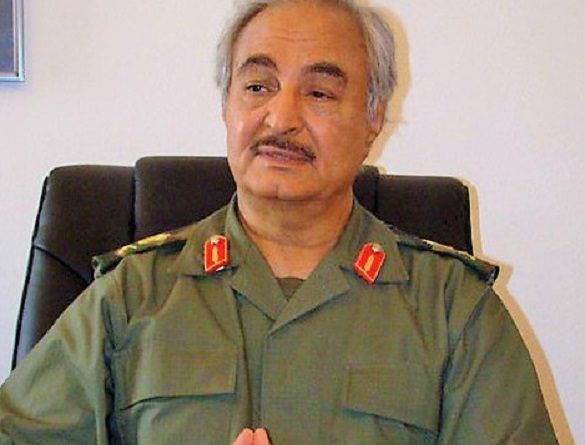Libyan Leader Haftar Invites Occidental and US Oil to Return
The military leader of Eastern Libya, Field Marshal Khalifa Khaftar, has made an unprecedented bid for US and Israeli support, indicating possible recognition of Israel by the Tobruk-based government loyal to him and sending a message to Washington via Israeli channels inviting US oil companies to return to the fields they worked years ago. The message is thought to be particularly directed at Occidental, which operated both its own Zuetina field in the Sirte basin and the fields of other US companies within the area now controlled by the government of Eastern Libya. The US businessman, Carl Icahn, a strong supporter of Israel who briefly served as an advisor to President Trump in 2017, is now a major force in the company and Haftar doubtless hopes to tempt him and others with the prospect of recovering access to what had been historically some of their most profitable assets — and at the same time secure broad supporter by an embrace of relations with Israel. Despite stepping down as an advisor in 2017, he remains on good terms with both the President and his son-in-law, Jared Kushner.
Besides confidential messages, Hafter has publicly signalled this shift in strategy by means of interview between the Deputy Prime Minister of the Eastern government, Abdul Salem al- Badri, and the Israeli publication, Makor Rishon. Owned by US businessman Sheldon Adelson, a donor to the Trump campaign, Makor Rishon is considered to be close to Israeli Prime Minister Benyamin Netanyahu and other Likud Party politicians in Israel. In the interview, Badri took the opportunity to tell Netanyahu ‘we have never been and never will be enemies’, and went on to appeal to Israel to support the Eastern government. Not only this: he called on Israel to join a maritime agreement with Greece, Cyprus, Lebanon and Egypt that is a direct counter to a maritime boundary plan for exclusive economic zones put forward by the Turkish Prime Minster Recep Tayyip Erdoğan that the Turkish-backed leader of the Government of National Accord in Tripoli, Fayez al-Sarraj, has signed up to; this plan excludes Cyprus and infringes on the maritime interests of Greece and Egypt.
Erdoğan’s intervention in support of the Tripoli-based government in its conflict with the Eastern government helped thwart Hafter’s offensive against the Government of National Accord in 2019. Since then his Libyan National Army has been on the defensive as thousands of jihadis previously linked to Islamic State and other groups in Syria have poured into Libya from Turkey with the aid of the Turkish government and Qatar to bolster the official Libyan army, which has in recent months pushed Haftar’s forces back to Eastern Libya, known as Barka or Cyrenaica. This turnaround was directly aided by Turkish armed forces and has led some commentators to speculate that Haftar is ‘finished’. Last week’s initiative to secure the support of Israel and the US is likely to be interpreted similarly by some, seeing it as an act of desperation; but that ignores the strong support Haftar is getting from Russia, which has already shown how it can prevail in Syria.
On 13 June, a Russian air force Tupolev flew to Istanbul with staff to set up a summit on Libya and Syria between Russian Foreign Minister Sergie Lavrov and his Turkish counter-part, Mevlüt Çavuşoğlu — only for the meeting scheduled for the 14 and 15 June to be abruptly cancelled by Erdoğan. It is understood the Russians wanted to meeting to reach an informal agreement on spheres of interest in Libya, by which Sirte, Jufra and the Sirte basin (where much of the Libyan oil reserve is located) were acknowledge by the Turks to be under the authority of the Tobruk-government. Right now, Erdogan feels he has the advantage on the ground and is probably playing for time ahead of showing receptivity to a deal. Snubbed by Erdogan, the Russians will now almost certainly act on the ground militarily and already there are reports that Russian military planes have begun flying into Eastern Libya and that Russian MIG fighters are being gathered on the border with Egypt. Meanwhile, the Eastern government, which also has the benefit of support from Egypt and UAE — and Israeli advisors — is talking about a formal declaration of independence, in effect secession from the rest of Libya if necessary. The legitimacy for this will come from a vote of the Libyan House of Representatives, which relocated to Tobruk in 2014 when islamist factions took over the capital — and it will have its supporters in Washington as well as its opponents. And once done, it may remove the formal bar to oil company contact with the National Oil Co in Tobruk.
The impediment to US support — certainly at an official level — is the international recognition awarded to the Government of National Accord in Tripoli under Fayez al-Sarraj and concerns about Russia becoming entrenched on the southern shore of the Mediteranean. With Israeli assistance, the legitimacy of this government may well be challenged as atrocities committed by jihadi groups supporting the Libyan army come to light — for example at Tarhuna. And strategically, there is a risk that if the Eastern area is dependent on Russia, that could work against NATO long-term. In the meantime, increased unofficial contact between Haftar and the US is likely despite some resistance, especially from the Embassy in Tripoli; surprisingly, he remains a US citizen thanks to his previous exile from Libya and his sons continue to live in Virginia where US officials have access to them.
* The anonymousoiltrader.com has unrivalled expertise on the oil affairs of both the House of Representatives’ government of Eastern Libya and Government of National Accord in Tripoli welcomes communications on the matter.




